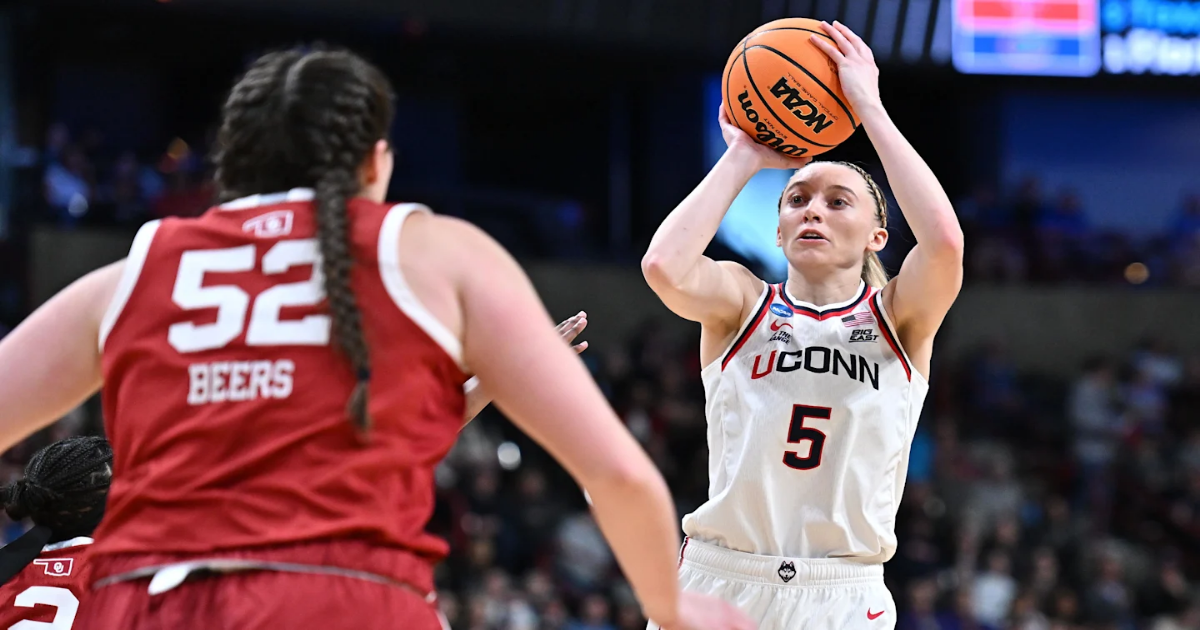
Bueckers’s 40 points were a career high and also set a program record for points scored in a women’s NCAA tournament game. / James Snook-Imagn Images
SPOKANE — Paige Bueckers left the floor after the biggest performance of her career, after the biggest of any career in a program made of big performances, and UConn Huskies coach Geno Auriemma asked her a question.
Did you really, seriously want to come out of the game, or did you just want to get this standing ovation?
Bueckers grinned. She was tired, and she could use a breather, she said. But the ovation was a nice perk.
Just over three minutes remained in a Sweet 16 game that No. 2 seed UConn led by almost 30. A halftime deficit had turned into the kind of lead that produces sideline cracks from the coaching staff and thunderous cheers from the crowd. Nearly all of that cushion had come from Bueckers.
She dropped 40 points in what became an 82–59 win over the No. 3 seed Oklahoma Sooners as the Huskies punched a ticket to the Elite Eight. The day had turned into a display of everything that Bueckers can do at her best, a smooth, efficient constellation of pull-up jumpers and three-point splashes. It was a career high for her and an NCAA tournament program high for UConn, which has given more historically great players more opportunities to shine in tournament games than any other school. But none of them ever did exactly what Bueckers did in this Sweet 16.
UConn hit the locker room at halftime, losing by four in a game it should have been winning. It failed to capitalize on easy opportunities throughout a tight, choppy first half. Bueckers led the group with 11 points on 4-of-11 shooting. Auriemma used the half to rag on her for a series of defensive lapses. And she responded the way that he knew she would. Bueckers took over completely in the second half. She was all but literally automatic, pouring in 29 points while shooting 12-of-16, a game’s worth of remarkable production condensed into two quarters.
“Paige was spectacular,” Auriemma said. “That was as good a game as I’ve seen her play the whole time she’s been here.”
More. SI March Madness. Men’s and Women’s NCAA Tournament News, Features and Analysis. dark
Asked to elaborate a few minutes later, the veteran coach demurred, falling back into the wisecracking that he usually runs with his star. (“Did I really say that, that that’s the best I’ve seen her play? That came out of my mouth?” Auriemma said. “Well, that’s the most I’ve seen her shoot.”) But the compliment was already out there, and it was hard to argue with. Bueckers has put together many solid, productive games in her four seasons played in Storrs, an impressive career on a campus full of those. But she has never had a performance this overwhelmingly dominant.
UConn is not built to require heroics from Bueckers. This is the healthiest, most complete roster the program has enjoyed in years, and the demands on its star have shifted accordingly. Those demands are still considerable: Bueckers remains the leading scorer and facilitator here. However, the graduate student has averaged fewer shots per game this year than in any previous full season of her career. She is always the focal point. She is rarely asked to play the hero.
There is nothing unusual about that at UConn, where it has long been standard not to run on monster individual performances. “This is a signature of our program,” Huskies associate head coach Chris Dailey says. “Our best players have always done what they needed to do in that moment.” What they need to do generally does not result in this kind of forceful display.
But the Huskies needed that from Bueckers on Saturday. Freshman phenom Sarah Strong was struggling to get established inside. Azzi Fudd was not finding clear opportunities. UConn’s typically balanced offensive attack was sputtering. And even on this roster full of talented, capable options, there was no question about whose job it might be to step up.
“This is what Paige does,” Fudd says. “She wants all of that.”
Bueckers has wanted it for a long time. The 23-year-old has spent more time in college than she planned, delayed and compromised by injuries, and she has not yet landed the championship she has always wanted to win at UConn. She has strung together years of effective tournament performances, but that had not included a signature, transcendent one that showed the full range of her skill set until Sunday.
“She’s very unselfish, and she prides herself on her efficiency,” Dailey says. “But she knew what we needed today.”
And she delivered it.
